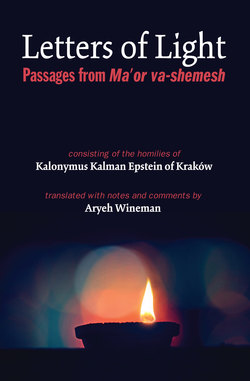Читать книгу Letters of Light - Kalonymus Kalman Epstein - Страница 13
На сайте Литреса книга снята с продажи.
Tol’dot
ОглавлениеThe Lure and Cooling of Appetite69
“And the Lord said to her (to Rebecca), ‘Two nations (goyim) are in your womb.” (Gen 25:23)
[On the basis of sound-similarity], Rashi 70 explained this verse in reference to two persons of lofty rank (geiʾim), Antigonus [a high Roman official in Palestine] and Rabbi [Rabbi Yehuda ha-Nasi, the rabbinic sage who edited the Mishna in the early third century, C.E.] on whose tables neither radish (tz’non) nor horseradish (ḥazeret) were ever absent. His words allude to the saying of our Sages of blessed memory that now [in the absence of the altar in the Temple which had been destroyed], our eating-table serves as a means of atonement.71
The words would seem to convey that the righteous walk in the ways of the Torah of God and do not pursue (material and gastronomical) desires, eating only what is necessary for the maintenance of the body which enables them to engage in the service of God. Eating at their table, they abstain, even in the middle of a meal, and even when their inclination burns to tempt them to continue with some tasty food or sweet drink, they cool off their inclination to eat or drink more. And they even worry and engage in repentance (t’shuvah) concerning what they have already eaten, lest they ate or drank more than was necessary. This is overheard in the words ts’non and ḥazeret, for they cool off (miston’nim) their inclination (and desire) and repent (ḥozrim bit’shuvah) concerning what they had done.
This contrasts with the way of the wicked. For even if they had engaged in some mitzvah with enthusiasm and great desire, the wicked cool off that spiritual enthusiasm and turn from it due to their stronger desire for additional food and drink.
The same pattern [of cooling off and repenting, linguistically symbolized by the radish and the horseradish] characterizes both the righteous and the wicked, though in diametrically opposite directions.
Comment: The talmudic passage on which this brief discourse is based, a statement of Rabbi Yehudah in the name of Rav, read the two nations (goyim), mentioned in a verse from the Torah-reading, as indicating two persons of lofty rank (geiʾ im), namely Antigonus and his contemporary, Rabbi Yehudah haNasi (“Rabbi”). Rashi, in his comment on that source, explained that the former was a descendent of Esau (Edom/Rome) while the latter was a descendent of Jacob.
The talmudic passage states that lettuce, radish, and cucumbers were always to be found on Rabbi’s table for reasons having to do with how their respective medicinal properties effect the body. That kind of statement might indeed interest those curious about ancient medicine. The passage as re-stated in Maʾor va-shemesh, however, understands radishes and horseradish-root symbolically in terms of the letters and sounds comprising those words and brings the listener into a very different world of concern—not physical health-measures, but rather two distinct types of persons with very different value-systems and dispositions. The “righteous” (represented by Rabbi) regard food as a requirement of bodily survival which, in turn, is viewed as necessary in order to serve God in life, while the “wicked” (represented by Antigonus) eat out of a boundless desire for food and drink. The first emphasize the spiritual dimension of life, while for the second group the lust for food, beyond any health-considerations, takes precedence.
In addition to the liberty the preacher has allowed himself in arriving at what he claims to be the real contrast between the two men, he added what might be a humorous nuance in locating a shared formula at work in terms of each of the two groups: each follows the same basic formula, one which, however, is interpreted in terms of distinctly opposing sets of values.
69. Maʾor va-shemesh, I, 17a.
70. Based on Rashi’s comment on b. ʿAbod. Zar. 11a.
71. b. Ber. 55a.
